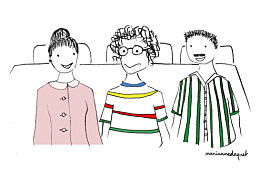Discovering the many languages of England
 Allo pet, wud’ya lahk some chips wi’ tha’?”
Allo pet, wud’ya lahk some chips wi’ tha’?”
“Sorry?”
“I saihd, wud’ya lahk some chips wi’ tha’?”
Aha, a revelation. This dinner lady wasn’t trying to make every humanly possible sound in one sentence, nor was she trying to recite King Lear or Robbie Burns. She was, in fact, talking to me in the “King’s English.” This, combined with a similar miscommunication with a college porter, led me to a sad and simple fact: Despite having lived in Durham for the best part of four months, I still don’t understand the Geordie accent.
When I applied to UK universities, someone neglected to mention that Durham isn’t really an English-speaking county: It’s pure Geordieland. It is quite easily one of the most difficult dialects I’ve ever come across, and considering I’ve lived in Beijing, Hong Kong and Wales, that is quite a statement. Almost but not quite Scottish, I reckon Durham-speak is in fact harder to understand than more northerly variants, not just because words are pronounced differently, but also because they use so many entirely different words. Have you ever eaten a “barm” for example? How would you respond if someone calls “howay” to you? Do you actually know what (or where) the “toon” is?
Not that I dislike Geordies in any way. They are, from my experience, some of the nicest and most genuine people you could come across. I was speaking to a couple on a train-ride from Durham to Newcastle recently, and not only were they very nice people but also incredibly well-travelled. My point in bringing this up, I suppose, is to explode another widely held myth about people in this northerly corner of the UK: People here are not the ignorant, backward, provincial folk shown in countless sitcoms but increasingly cutting-edge businessmen, artists and metropolitan citizens. Newcastle itself is in a period of dramatic urban renewal, with the Sage art gallery and Gateshead developments allowing for greater cultural expression.
But back to Durham and language with another interesting fact that I’ve encountered since coming here: almost all the students here are from the south. It is possible therefore for someone to come up to Geordieland with its strange accent and actually leave with more of a southern one. I know this because it’s happening to me. My best friends here, who I shared a corridor with last term, are from London, Portsmouth, Brighton and Bath, leaving me as the only “northern” person left (if Derby can be counted as such). So, as much as I’ve picked up Newcastle phrases, I’ve picked up a lot more London ones. For example, to pronounce “bath,” I would normally say it with a short “a” sound (such as in “tap”), but my friends say “barth” – a petty distinction, some might say, but I don’t think so! There isn’t an “r” in bath.
Annoying though my southern friends’ accents are and fiendishly difficult though the Geordie accent may be, there simply isn’t a language as complex and hair-pullingly frustrating as good old Chinese. Ever since I left Beijing, it has been my intention to carry on what little studying I did there and hopefully one day say I mastered it. That day is still a long way off, but I’m working on it. I currently have one lesson a week (every Tuesday) with the Durham university language center on a course open to anyone. We make a strange and quirky little crowd: from the Italian couple who work meticulously and ask billions of questions, to the big bumbling philosophy student who has studied Chinese philosophy but doesn’t get the language, the clean-cut public school kid who’s studied Mandarin at school and knows all the grammatical complexities but none of the words, and me – didn’t really study the language, its grammar or vocabulary but has had the beneficial and unique advantage of actually having lived in China.
Surrounded by these people, I really came to appreciate how lucky I was to have lived in a place that is almost a myth here. What’s more, I’d also like to make a plea to all those reading this article: Make the most of your time in Beijing, because everyone I’ve spoken to here would love to be in your shoes.



